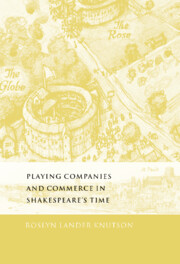Book contents
- Frontmatter
- Contents
- List of maps and tables
- Acknowledgements
- 1 Theatre history as personality
- 2 Players and company commerce
- 3 Playwrights, repertories, the book trade, and company commerce
- 4 Histrio-Mastix and company commerce
- 5 Hamlet and company commerce
- 6 Poetaster, Satiromastix, and company commerce
- 7 Conclusion: Hot Anger and company commerce
- Notes
- Bibliography
- Index
6 - Poetaster, Satiromastix, and company commerce
Published online by Cambridge University Press: 22 September 2009
- Frontmatter
- Contents
- List of maps and tables
- Acknowledgements
- 1 Theatre history as personality
- 2 Players and company commerce
- 3 Playwrights, repertories, the book trade, and company commerce
- 4 Histrio-Mastix and company commerce
- 5 Hamlet and company commerce
- 6 Poetaster, Satiromastix, and company commerce
- 7 Conclusion: Hot Anger and company commerce
- Notes
- Bibliography
- Index
Summary
Hee wold have slong iests at him as hard as stones till he had pelted him out of this place
Poetaster, as quoted by Edward Pudsey, in his Commonplace BookIn an entry dated 3 November 1600, Henry Travice, steward to Sir William Cavendish, recorded in an account book an expenditure of 18d. for his master's “going to a play at paules.” Over the next two years, Travice made additional entries of payments for his master's playgoing. As in the entry for 3 November 1600, Travice sometimes named the playhouse that Cavendish attended: Paul's in October 1601, June 1602, and November 1602; Blackfriars in October and November 1601. The Cavendish records are new evidence of a long-assumed phenomenon, namely, attendance by persons of noble birth at the boys' playhouses after their opening in 1599 (Paul's) and 1600 (Blackfriars). During the nineteenth century, scholars became convinced that the nature of company commerce in Shakespeare's time could be deduced from this moment of competition for the better class of playgoer. The “little eyases” passage in Shakespeare's Hamlet seemed to reveal the fear of the Chamberlain's Men that men such as Cavendish now would not only prefer the private theatres but also choose them exclusively. The complaint by the player Histrio in Jonson's Poetaster that his company's players were like starving snakes seemed to reveal that such fear was justified.
- Type
- Chapter
- Information
- Playing Companies and Commerce in Shakespeare's Time , pp. 127 - 146Publisher: Cambridge University PressPrint publication year: 2001



